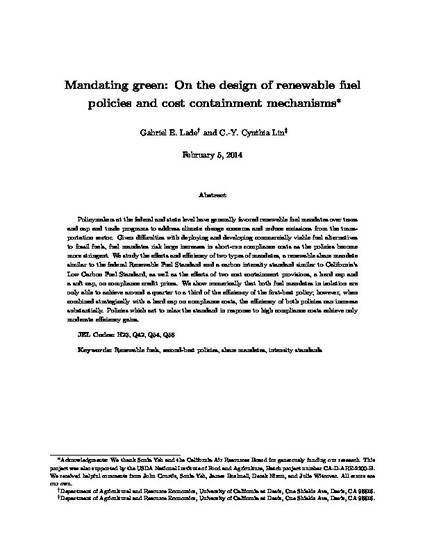
Other
Mandating Green: On the Design of Renewable Fuel Policies and Cost Containment Mechanisms
(2014)
Abstract
Policymakers at the federal and state level have generally favored renewable fuel mandates over taxes
and cap and trade programs to address climate change concerns and reduce emissions from the trans-
portation sector. Given difficulties with deploying and developing commercially viable fuel alternatives
to fossil fuels, fuel mandates risk large increases in short-run compliance costs as the policies become
more stringent. We study the effects and efficiency of two types of mandates, a renewable share mandate
similar to the federal Renewable Fuel Standard and a carbon intensity standard similar to California's
Low Carbon Fuel Standard, as well as the effects of two cost containment provisions, a hard cap and
a soft cap, on compliance credit prices. We show numerically that both fuel mandates in isolation are
only able to achieve around a quarter to a third of the efficiency of the fi
rst-best policy; however, when
combined strategically with a hard cap on compliance costs, the efficiency of both policies can increase
substantially. Policies which act to relax the standard in response to high compliance costs achieve only
moderate efficiency gains.
Keywords
- renewable fuels,
- second-best policies,
- share mandates,
- intensity standards
Disciplines
Publication Date
2014
Comments
Copyright 2014 The Authors
Citation Information
Gabriel E. Lade and C.-Y. Cynthia Lin. "Mandating Green: On the Design of Renewable Fuel Policies and Cost Containment Mechanisms" (2014) Available at: http://works.bepress.com/gabriel-lade/2/
